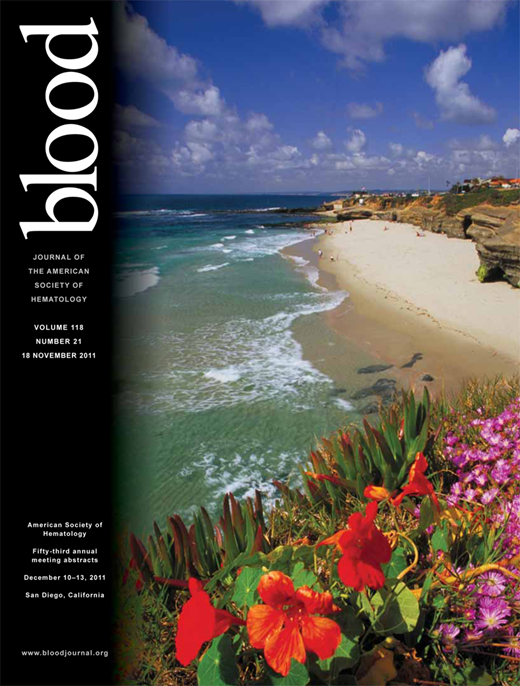Abstract
Abstract 2652
The mature B-cell neoplasms marginal zone lymphoma (MZL), lymphoplasmacytic lymphoma (LPL) and Waldenstrom macroglobulinemia (WM) display considerable overlap in clinic presentation, morphology, immunophenotype and genetic features. There is known to be poor reproducibility in the classification of these disorders and often only minimal diagnostic material is available. Multiparameter flow cytometry is a valuable tool for diagnosis and monitoring of B-cell disorders that can be applied to low cellularity samples or when the neoplastic cells represent a minority of total leucocytes. However, even when using large numbers of markers it is not possible to discriminate between MZL, LPL and WM and the aberrant expression of certain markers appears to occur with similar frequency in the different disease categories. The aim of this study was to determine whether there are phenotypically distinct entities within the spectrum of marginal zone and lymphoplasmacytic lymphomas, and to correlate these entities with clinical features.
Samples from 146 people with a diagnosis of MZL, LPL or WM (122 bone marrow, 13 peripheral blood, 10 tissue biopsies), 8 with hairy cell leukemia, 10 reactive lymph node biopsies and 10 normal bone marrow samples were analysed using a panel of 39 markers. A minimum of 50,000 cells were acquired and analysed using a BD FACSCanto II with Diva software. Median fluorescence intensities were recorded for neoplastic CD19+ B-cell populations as well as for germinal centre (GC) and non-GC lymph node B-cells, B-progenitors, mature B-cells and plasma cell populations. Unsupervised cluster analysis was performed using dChip software. Clinical features and outcome data were collected and recorded centrally (www.hmrn.org.uk).
Cluster analysis identified 5 entities with significant differences in their immunophenotypic profile. Neoplastic cells in all the MZL/LPL/WM groups typically expressed CD31, CD39 and CD49d with lack of CD10, CD23 and weaker expression of LAIR1 (CD305), CXCR5 (CD185) and CD22 compared to normal B-cells. CD5 and CD43 were expressed in a subset of cases but co-expression occurred in <1% of cases. The groups are characterised as follows: (1) clustered with normal mature B-cells, characterised by weaker CD20/CD95 and stronger CXCR5 expression relative to other MZL/LPL/WM cases, shorter survival, anemia and lymphadenopathy, typically requiring therapeutic intervention at diagnosis; (2) clustered with HCL, characterised by CD25 and CD11c expression and a higher degree of extranodal involvement; (3) did not cluster with other B-cell types, characterised by very strong CD79b and surface IgM expression often with anemia requiring supportive care; (4) characterised by strong CD24 expression with relatively good clinical course; and (5) clustered with normal bone marrow plasma cells, characterised by weak CD20, CD24 and IgM expression and also with better clinical features.
| Group . | 2 year survival . | Anemia (Hb <10.5g/dL) . | Lympho-cytosis (>4 × 10^9/L) . | Raised B2M (>2.7mg/L) . | Lymph-adenopathy (≥2 nodes) . | Extranodal involvement . | Therapeutic intervention at diagnosis . |
|---|---|---|---|---|---|---|---|
| 1 | 15/24 (63%) | 10/19 (53%) | 9/19 (47%) | 8/10 (80%) | 12/19 (63%) | 4/19 (21%) | 14/19 (74%) |
| 2 | 28/37 (76%) | 8/25 (32%) | 11/25 (44%) | 6/11 (55%) | 9/23 (39%) | 10/23 (43%) | 9/25 (36%) |
| 3 | 25/31 (81%) | 14/24 (58%) | 5/23 (22%) | 11/18 (61%) | 4/19 (21%) | 5/19 (26%) | 13/24 (54%) |
| 4 | 22/27 (81%) | 5/22 (23%) | 5/22 (23%) | 10/17 (59%) | 5/20 (25%) | 4/20 (20%) | 8/22 (36%) |
| 5 | 22/26 (85%) | 5/16 (31%) | 5/16 (31%) | 6/8 (75%) | 8/14 (57%) | 5/14 (36%) | 5/16 (31%) |
| Group . | 2 year survival . | Anemia (Hb <10.5g/dL) . | Lympho-cytosis (>4 × 10^9/L) . | Raised B2M (>2.7mg/L) . | Lymph-adenopathy (≥2 nodes) . | Extranodal involvement . | Therapeutic intervention at diagnosis . |
|---|---|---|---|---|---|---|---|
| 1 | 15/24 (63%) | 10/19 (53%) | 9/19 (47%) | 8/10 (80%) | 12/19 (63%) | 4/19 (21%) | 14/19 (74%) |
| 2 | 28/37 (76%) | 8/25 (32%) | 11/25 (44%) | 6/11 (55%) | 9/23 (39%) | 10/23 (43%) | 9/25 (36%) |
| 3 | 25/31 (81%) | 14/24 (58%) | 5/23 (22%) | 11/18 (61%) | 4/19 (21%) | 5/19 (26%) | 13/24 (54%) |
| 4 | 22/27 (81%) | 5/22 (23%) | 5/22 (23%) | 10/17 (59%) | 5/20 (25%) | 4/20 (20%) | 8/22 (36%) |
| 5 | 22/26 (85%) | 5/16 (31%) | 5/16 (31%) | 6/8 (75%) | 8/14 (57%) | 5/14 (36%) | 5/16 (31%) |
The results indicate that the current diagnostic categories of MZL and LPL/WM have a great degree of overlap and comprise a number of phenotypically distinct entities which also appear to have different clinical features and outcomes. Enhancing the classification is likely to facilitate diagnosis, monitoring and identification of the underlying features of these B-cell malignancies.
Rawstron:BD Biosciences: Patents & Royalties.
Author notes
Asterisk with author names denotes non-ASH members.

